
Farm to Cafeteria Canada is a pan-Canadian organization whose vision is to “create vibrant and sustainable regional food systems that contribute to the health of people, place and the planet.” It works with partners across the country to educate people, build capacity, strengthen partnerships and influence policy to promote access to local, healthy and sustainable food in all public institutions.
The Public Health Agency of Canada supports innovative partnerships with the private and not-for-profit sectors and organizations outside the health care sector to create new solutions to help Canadians lead healthy lives, promote healthy eating and physical activity and tackling common risk factors for major chronic diseases.
The Whole Kids Foundation is an independent, non-profit organization located in Austin, Texas. By empowering schools and inspiring families in the United States, Canada and the United Kingdom, they help children enjoy optimal health thanks to a strong and healthy body that thrives on nutritious food.
The Social Planning and Research Council of British Columbia (SPARC BC) is a leader in applied social research, social policy analysis and community development approaches to social justice. SPARC BC works with communities to create a just and healthy society for all.
A voluntary, not-for-profit organization, the Public Health Association of British Columbia (PHABC) is a member-driven, non-governmental entity that provides leadership to promote health, well-being and social equity.
Farm to School BC a PHABC initiative that encourages and helps schools and communities work together to bring healthy, local, equitable and sustainable food to schools in British Columbia.
Sustain Ontario is a provincial cross-sector alliance that promotes healthy food and agriculture. The Ontario Edible Education Network, an initiative of Sustain Ontario, was established to bring these groups together to exchange resources, ideas and experiences, collaborate on advocacy and make it easier to encourage children and youth to eat, grow, cook, celebrate and experience healthy, locally produced, sustainable foods in Ontario.
Équiterre is an organization based in Montreal, with branches in Quebec City and Ottawa, which offers concrete solutions to accelerate the transition to a society where citizens, organizations and governments make ecological choices that are also healthy and equitable.
Food First NL is a provincial, not-for-profit organization that is advancing food security in Newfoundland and Labrador since 1998. Its mission is to actively promote comprehensive community solutions to ensure access to healthy and adequate food for all.
The Department of Agriculture, Aquaculture and Fisheries is mandated to develop and implement a total operational approach for the agriculture, aquaculture and fisheries sectors, as well as for value-added production. This approach aims to improve the economic competitiveness and sustainable development of these sectors and related industries.
Meal Exchange is a nationally registered charity that works with more than a third of Canadian universities and delivers programs in over 100 communities across the country. For more than 20 years, Meal Exchange has helped students develop innovative solutions to address food insecurity and build sustainable food systems on their campuses and with their communities.
Heart + Stroke: Life. We don’t want you to miss it. For over 60 years, Heart & Stroke has been dedicated to fighting heart disease and stroke. Our work has saved thousands of lives and improved the lives of millions of others.
The Coalition for Healthy School Food, the largest school food network in Canada, with over 200 non-profit member organizations from every province and territory, advocates for the creation of a universal cost-shared school food program for Canada, that would see all K-12 students having daily access to healthy food at school. Building on existing programs across the country, all schools will eventually serve a healthy meal or snack at little or no cost to students. These programs will include food education and serve culturally appropriate, local, sustainable food to the fullest extent possible.
Growing Chefs! Ontario is a registered charity based in London, Ontario that unites chefs, growers, educators and community members in children’s food education projects. Growing Chefs! Ontario offers a variety of Food Education Projects to get kids and communities excited about healthy, wholesome food!
Headwaters Food and Farming Alliance (HFFA) is a collaborative of community partners and volunteers who support activities to enhance local food and farming in Dufferin County and the Town of Caledon in Ontario. Its Farm to School initiative supports Salad Bar grants, connects farmers and schools, leads a regional Learning Circle and partners with Sustain Ontario to host the Ontario Lead for Farm to School. HFFA is a project of Headwaters Communities In Action (HCIA), a registered charity and community connector.
Alberta Food Matters, project coordination and support to participating schools.
Manitoba Association of Home Economists, project coordination and support to participating schools.
Food For All NB is a provincial bilingual organization that envisions a New Brunswick that is Informed, connected, & engaged in food security. We work to advance food security in New Brunswick by supporting champions, sharing information and resources, and supporting food actors on the ground and around decision-making tables.
Nourish NS is a registered non-profit supporting healthy food environments for children and youth. Nourish is on a mission to inspire every child in Nova Scotia to eat, enjoy and value food that fuels healthier people and a healthier environment. By empowering children and youth with the knowledge and skills to make informed decisions about their food and where it comes from, we are developing champions who demand better – for themselves, their families and their communities.
Q’wemtsín Health Society is an assembly of Health Care Professionals who believe in providing holistic health services to our Secwépemc communities. We offer a range of health programs, services, and education.
Farm to School: Canada Digs In! has been made possible by partnerships at the national, regional and community levels. In addition to the partner organizations listed above we would like to thank the following current and past members of the project delivery team: Murielle Vrins, Geneviève Chatelain, Colleen Thorpe, Clara Canac (Quebec); Sarah Ferber, Kristie Jameson, Suzanne Hawkins (Newfoundland & Labrador); Richard Han, Marcus Lobb, Claudia Paez, Kiku Dhanwant, Shannon Turner, Addie de Candole, Samantha Gambling (British Columbia); Carolyn Webb, Josie Di Felice, Phil Mount, Nicole Hambleton (Ontario); Melanie Cormier, Jill Mulholland, Alison Aiton, Leanne Prescott, Genevieve Drisdelle, Rachael Biggar (New Brunswick); Melodie Ho, Sheila Stark (Manitoba); Avni Soma, Wanda Laurin (Alberta); Anita Abraham, Celia White, Dayna Lahey, Matt Currie, Nicole Norris, Brittany Maguire, Jess Schellenberg (campus); Tracey O’Neil, Danielle Côte, Rachelle Bordeleau, Natali Bourret, Juliette Clochard (design and communications); Joanne Bays, Jesse Veenstra, Scott Graham, Christina Smith, and Jyotika Dangwal (national administration).
We would also like to express our sincere gratitude and admiration for the school and campus-based teams who have participated in this initiative to date. This includes countless dedicated teachers, principals, and other school and campus administrators; farmers, fishers, foragers, and other local food providers; chefs, food-service personnel, parents, Elders, community organizations, and of course – students! This initiative would not have been possible without your passion, creativity, and dedication to the farm to school movement.
You must be logged in to post a comment.
Multilingual WordPress with WPML

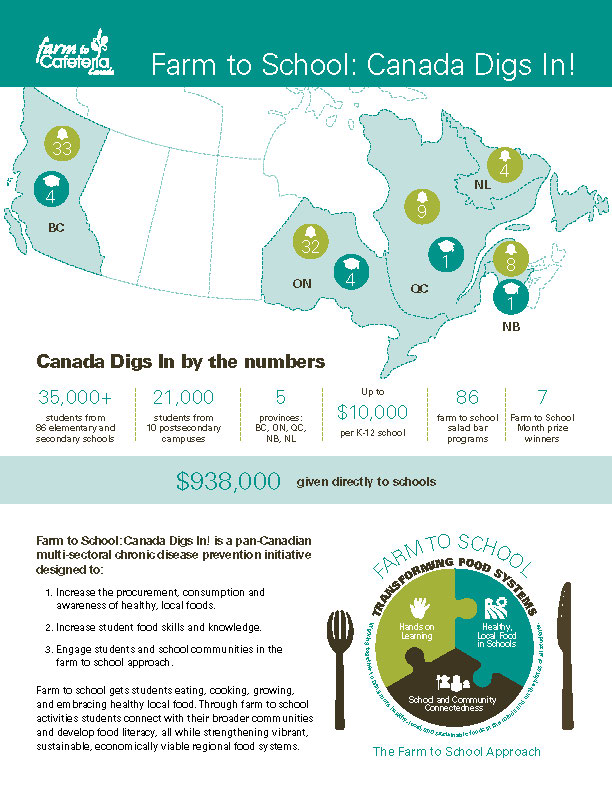
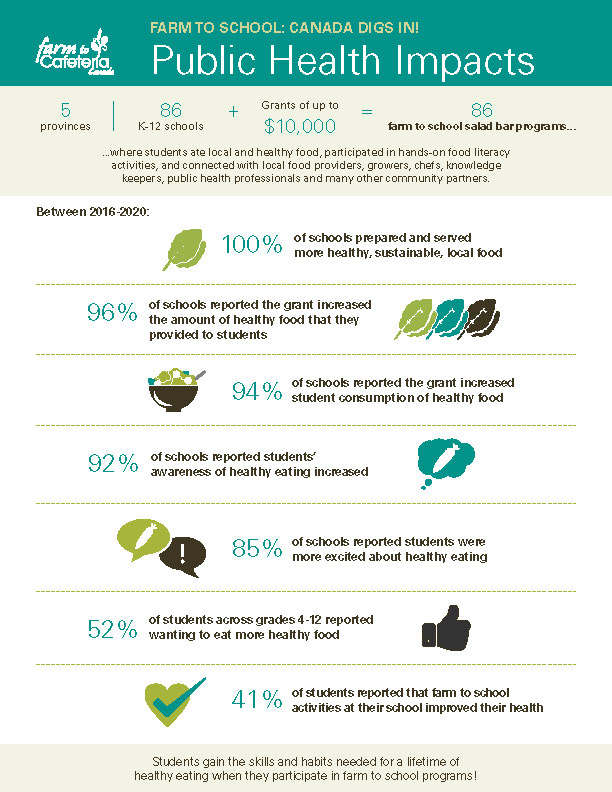
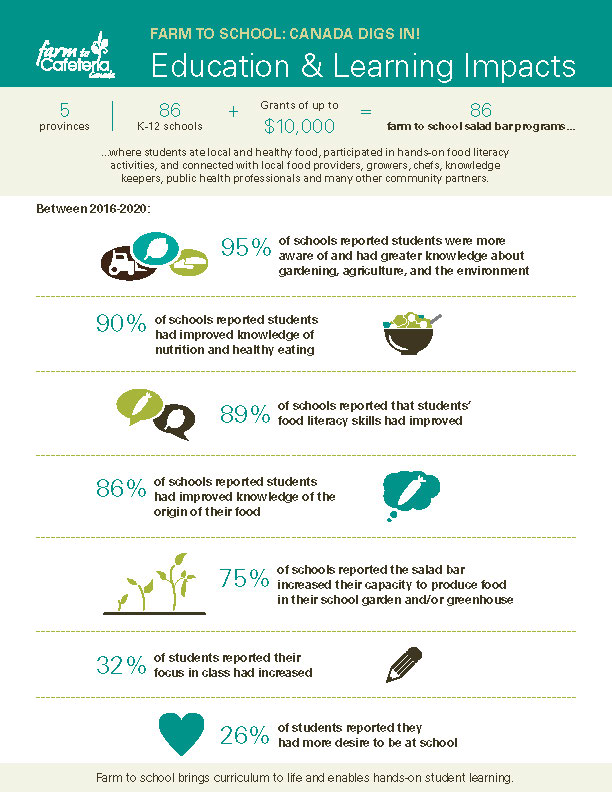
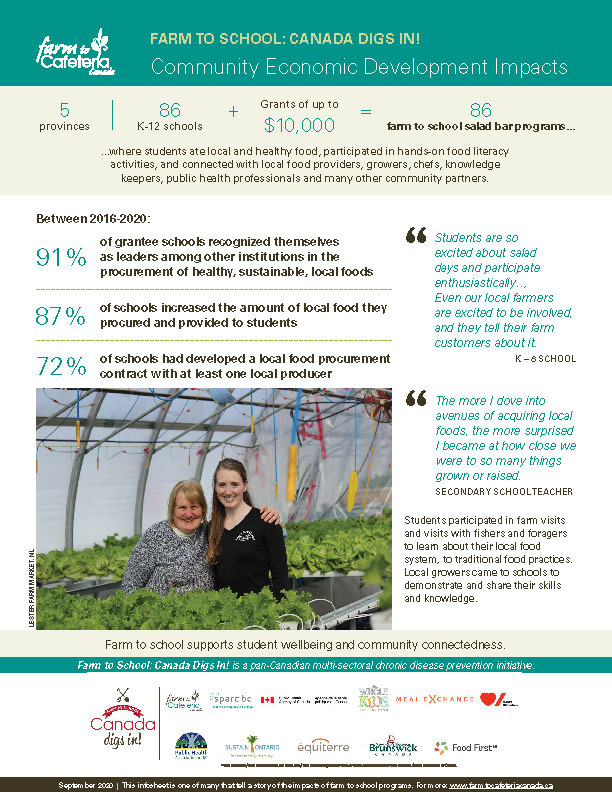
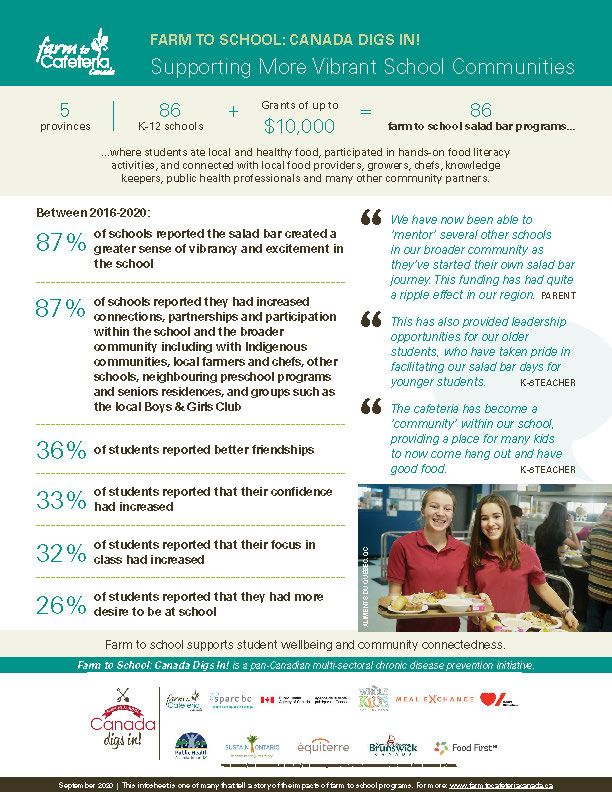
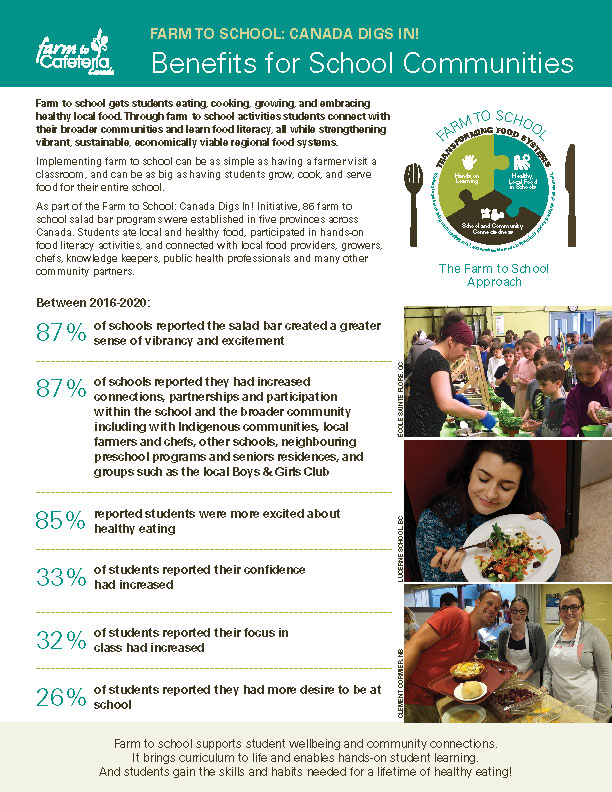
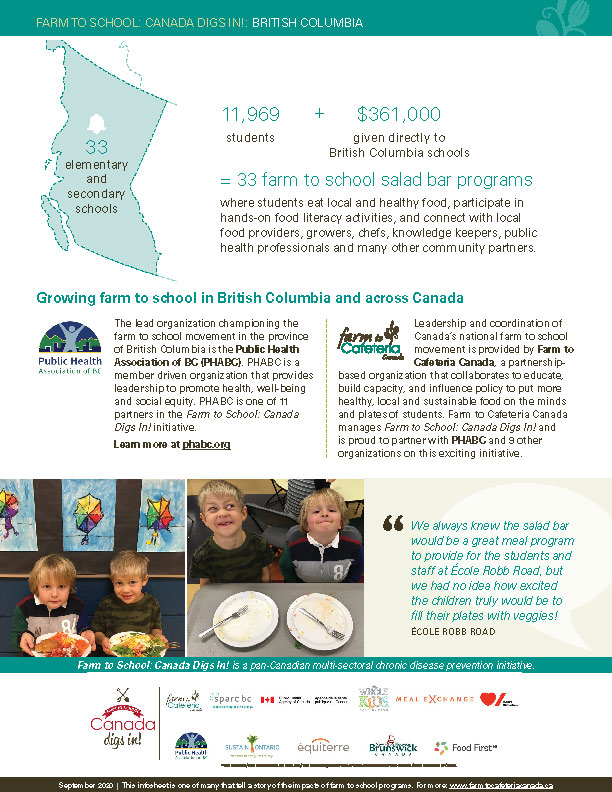
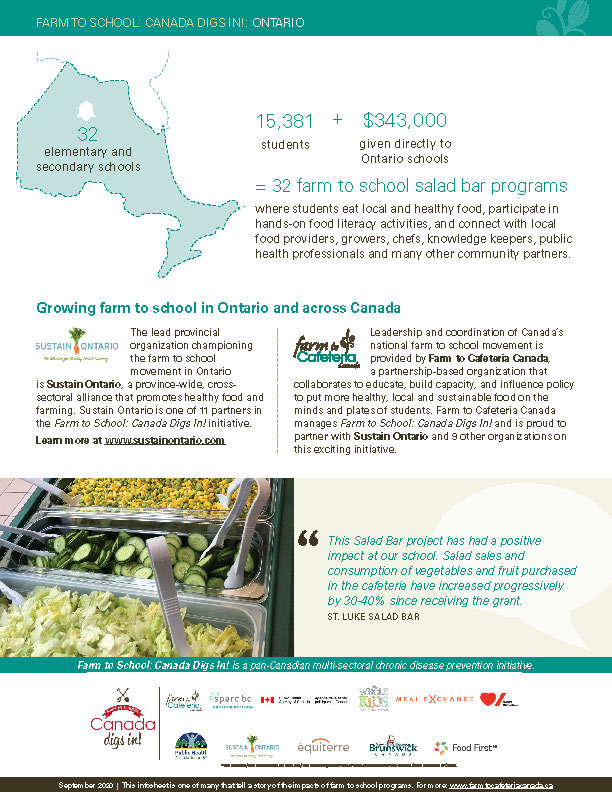
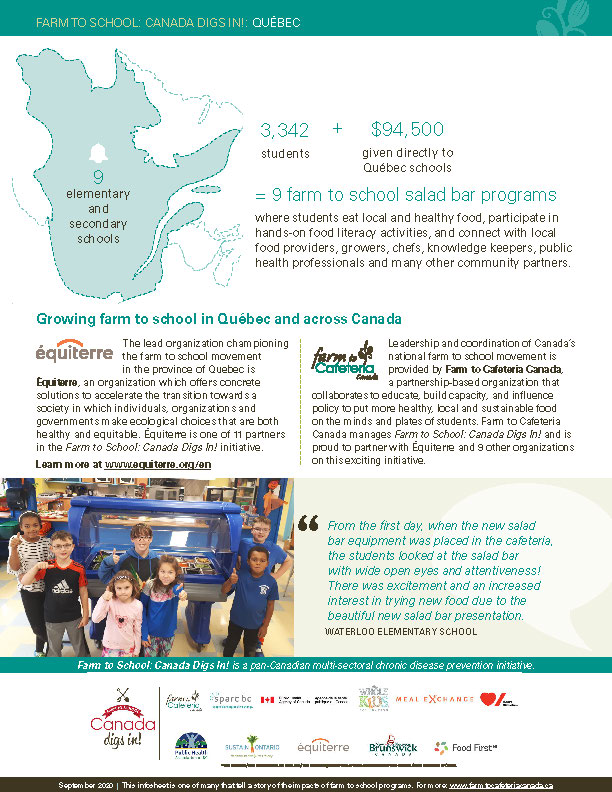
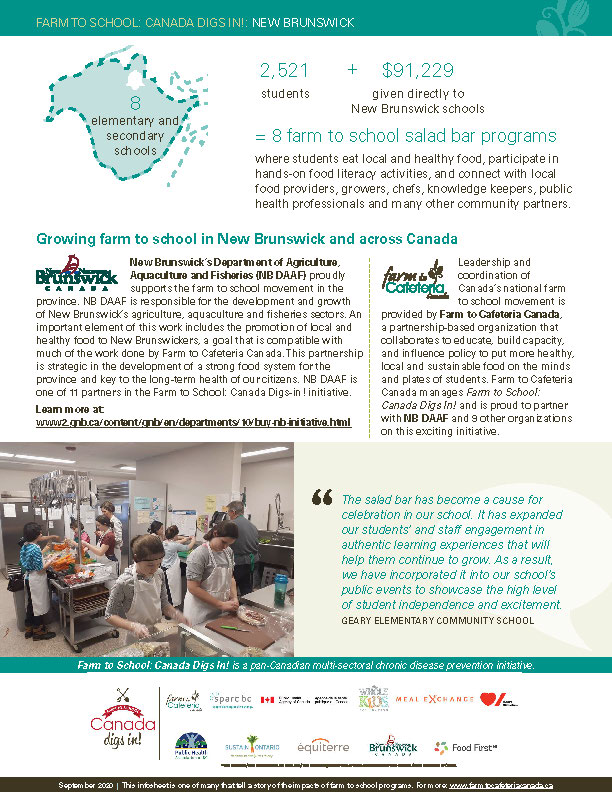
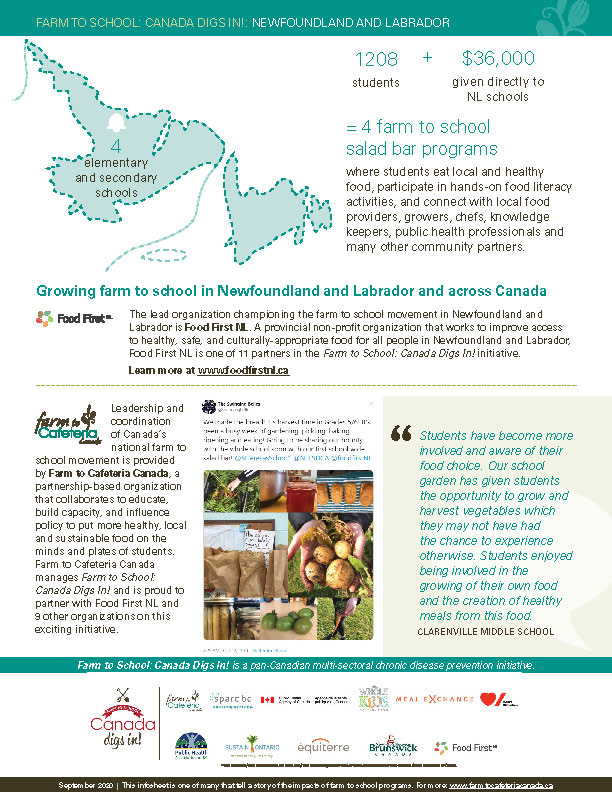

[…] A dozen agencies including the Public Health Agency of Canada, the Whole Kids Foundation and The Heart and Stroke Foundation have now invested more than $3.5 million to scale up farm-to-school through a new pan-Canadian initiative: Farm-to-School Canada Digs In! […]
Hello. I am an elementary school teacher and also a market gardener/farmer of organic vegetables. I am interested in finding ways to access funding to establish an onsite garden and greenhouse project at my school in Barrie, Ontario. The purpose would be to use the garden and greenhouse to support healthy snacking at school, nutrition education, and a variety of other curriculum linked programs. Happy to hear of how to get this started.
Hi Jonathan!
Thanks so much for contacting us! We would love to have your school involved in the Farm to School movement!
We do not yet have grants planned for 2019, but it is quite possible we’ll be issuing a call for grants at some time in 2019. My best suggestion for staying on top of this would be to follow us on social media, and sign-up for our newsletter (if you’re not already) .
If you’re just starting out, you can take a look at some of the resources (http://www.farmtocafeteriacanada.ca/resources/featured-resources/) we’ve published that give you a lot of great ideas on how to start a Farm to School program in your school. A really good resource that’s pretty much a step by step is our New Brunswick Farm to School Guide. http://www.farmtocafeteriacanada.ca/2017/12/new-brunswick-farm-to-school-guide/
You should also know that if your school is currently participating in any Farm to School activities, you can get involved in Farm to School Month which is happening right now! When you register, you have a chance to win a $1500 grant. This is only for the month of October, so you have one week left to enter. It’s a great way to get a little seed money for a school garden. http://www.farmtocafeteriacanada.ca/resources/featured-resources/
Other things you or your school can do is sign up for our newsletter on the home page of our website: http://www.farmtocafeteriacanada.ca/
It’s sent out twice a year, in the spring and fall.
You can also stay connected and follow us on social media at
Facebook: https://www.facebook.com/groups/FarmtocafeteriaCanada/
and Twitter: https://twitter.com/Farm2Cafeteria
Thanks so much and hope to have you join us soon!
THIS sounds like a wonderful idea…..have been involved in a similar concept in the Albert County area of N.B……school had garden plots that 3-4 people got the kids, at noon time, to come out and turn over, plant, watch and weed, for about 1 -1 1/2 months before school ended….the kids did not see the fruition of what they had planted. School ended and kids left. The 3-4 people getting the kids to plant could maintain the gardens throughout the summer if they wanted, but No kids were involved. Then the kids could enjoy some of the produce when they returned in the fall, IF there was any as through the summer, being unattended regularly, passersby with no concept of gardening or it’s advantages, would pull out an destroy the gardens, so there was very little to nothing for the kids to be involved in upon their return….seemed like a thankless venture for the 3-4 people involved and moot point for the kids as there was no way to “reap their rewards”. Glad to see a Practical concept that you present. Best of Luck with this
Thanks for contacting us lutes! There can be challenges to maintaining a school garden for all the reason you mention. A lot of the schools that maintain their gardens reply on volunteers to help out with weeding and harvesting. Posting signs that say “School Garden” might help passer-bys to recognize what the area is used for. This is one of the reasons why community involvement is so important! We hope you find the resources and personnel to help support your school’s garden in the future! Please feel free to look through our Resources section for ideas!
[…] health a priority by supporting innovative partnerships across Canada, like Kid Food Nation, Farm to School, and ParticipACTION. These initiatives aim to lower risk factors for developing chronic disease, […]
[…] (F2S) programs are having across the province and country by taking a look at the latest round of Farm to School: Canada Digs In! grant […]
[…] Farm to School: Canada Digs In! Report 2020, which tells the story of the first three years of the Canada Digs In! initiative — Canada’s first national farm to school initiative. This initiative was launched by F2CC with […]
[…] 2016 Sustain Ontario has partnered with Farm to Cafeteria Canada to deliver the Farm to School: Canada Digs In! initiative. This partnership has seen 40 grants of up to $10,000 given to schools in Ontario to […]
[…] CoP, which is being developed as part of Farm to Cafeteria Canada’s Farm to School: Canada Digs In! initiative, is intended for school food practitioners who are involved with an Edible Education […]
[…] following two stories share how F2CC’s Farm to School: Canada Digs In! grantee schools are shifting their own school food […]
Supported by multiple partners across the government, non-government, and private sectors, Canada Digs In facilitates the delivery of farm to school programs, the development of resources and tools, and the sharing of knowledge. The initiative was evaluated for participating schools between 2016 and 2020 in Canada’s first-ever comprehensive evaluation of the impacts of farm to school.
Thnaks